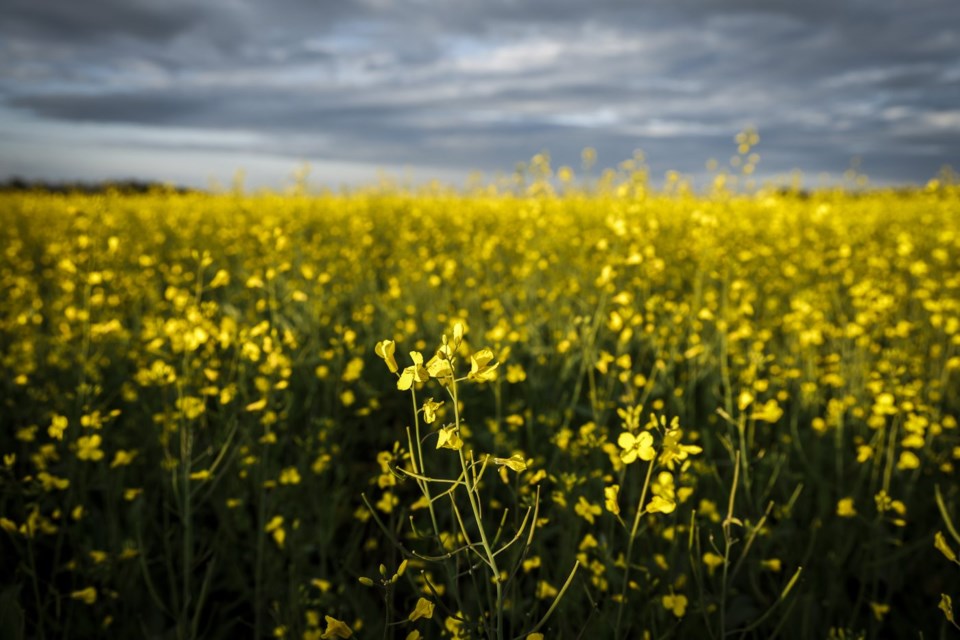Canada's canola industry is urging Ottawa to act as farmers brace for steep losses over a planned 75.8 per cent preliminary tariff from China on canola seed.
"The Chinese market is effectively closed to the Canadian canola industry, and this is a market that was valued at just under $5 billion," Chris Davison, president of the Canola Council of Canada, said after the tariff announcement Tuesday.
"The absence of that demand signal (from China) can be expected to have significant impacts for the industry moving forward."
China said the measure would start Thursday, nearly a year after Beijing launched an anti-dumping probe into Canadian canola. The investigation is in response to Canada's 100 per cent tariff on Chinese electric vehicles.
Ottawa has said China has until September, when its investigation formally ends, to make a final decision on the duties, but it can extend the deadline by six months.
China's Ministry of Commerce argued Canadian canola companies were "dumping" the product into the Chinese market, hurting its domestic canola oil market.
Canada's canola industry and Ottawa have rejected that claim, arguing its companies are following international rules-based trade. The Canola Council of Canada explains that anti-dumping investigations are launched when countries suspect products are being imported at lower prices than what they're sold for locally.
Last year, Ottawa imposed its tariff on Chinese-made electric vehicles and 25 per cent tariffs on Chinese steel and aluminum. Beijing retaliated with 100 per cent tariffs on Canadian canola meal and oil. China's latest move on canola seed now means all canola products face levies.
Saskatchewan Premier Scott Moe said he's expecting to speak with Prime Minister Mark Carney on the issue.
"We are asking that this be dealt with immediately," Moe said in Saskatoon.
The premier said Canada's canola industry supports 200,000 jobs and deserves as much support as other industries. He added the canola sector is larger than the steel, aluminum and electric vehicle industries combined.
"Our federal government cannot sacrifice a $43-billion canola industry that is largely based in Western Canada to protect a fledgling electric vehicle industry, largely based in Eastern Canada," Moe said.
Manitoba Premier Wab Kinew told reporters at an unrelated event near Kenora, Ont., that his government has offered supports through a farm income stabilization program.
Saskatchewan and Alberta have also adjusted the AgriStability program with Ottawa to increase compensation rates for farmers should their margins decline.
Alberta Agriculture Minister RJ Sigurdson said Ottawa should move urgently and speak constructively with Beijing.
"Alberta’s farmers, ranchers and processors did not create this situation, yet they are paying the price," he said in a statement.
China primarily uses Canadian canola seed for animal feed in the aquaculture sector.
Davison said Canada's canola industry will continue to meet the needs of Chinese customers. “It’s a political issue that requires a political solution,” he said.
In early June, Canadian and Chinese trade ministers committed to meet to address trade issues.
In a social media post Tuesday, China's Commerce Ministry said the countries met four days ago and discussed trade and ways to deepen co-operation.
The Prime Minister's Office deferred comment on China's latest canola tariff to the minister of international trade, who did not immediately respond to a request for comment.
Saskatchewan Opposition NDP Leader Carla Beck urged Moe to visit China immediately.
“Given the level of threat we see right now, it doesn’t make any sense to me that we are not using that office today to deal with this," she said in Regina.
Moe said he's open to going on a trade mission to China with Carney. Saskatchewan has a trade office in Shanghai, and Moe went there in 2018.
China remains a top importer of Canadian canola, but it exports few electric vehicles to Canada.
Canada has justified its levies on Chinese EVs by arguing they protect planned investments at home. Canada also matched a similar move by then-U.S. president Joe Biden, who hit Chinese EVs with American tariffs.
Environmental groups have called on Ottawa to revisit its tariff on Chinese EVs, arguing that allowing a limited quota into Canada would fill market gaps and drive competition.
Chinese EVs are significantly cheaper than North American-made EVs, in part because of lower labour and environmental standards and state subsidies.
The Chinese Embassy in Ottawa said in a statement the temporary tariff on Canadian canola seed comes as Canada's agriculture sector receives "extensive government subsidies and preferential policies" that distort demand and lead to overcapacity.
"China will continue to conduct the investigation in accordance with the law, fully protect the rights of all stakeholders, (and) make a final determination objectively and impartially based on the investigation results," the embassy said.
In a study published last December, after researching Beijing’s 2019 restrictions on canola imports, University of Toronto political scientist Lynette Ong wrote that China has weaponized its trading relations to extract political gains.
This report by The Canadian Press was first published Aug. 12, 2025.
— With files from Dylan Robertson in Ottawa
Nick Murray and Jeremy Simes, The Canadian Press




